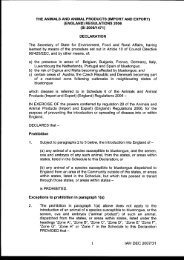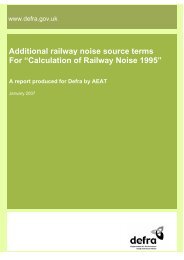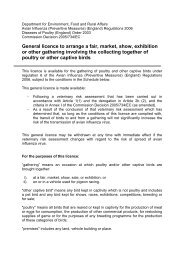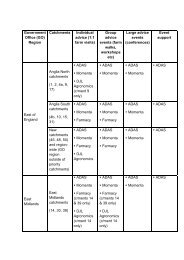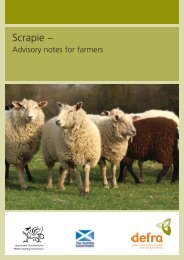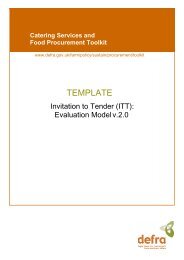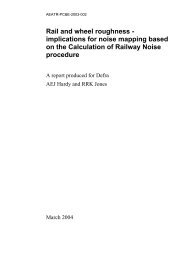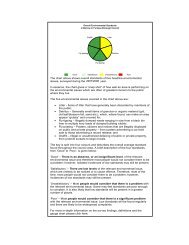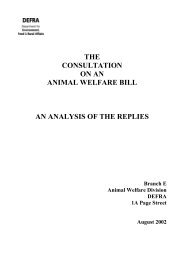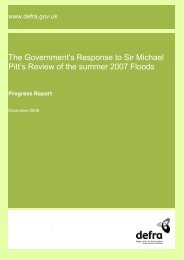Review of the Food-borne Zoonoses Research ... - ARCHIVE: Defra
Review of the Food-borne Zoonoses Research ... - ARCHIVE: Defra
Review of the Food-borne Zoonoses Research ... - ARCHIVE: Defra
Create successful ePaper yourself
Turn your PDF publications into a flip-book with our unique Google optimized e-Paper software.
Project code: OZ0319<br />
Project title: Salmonella pathogenesis in cattle and pigs<br />
Start date (dd/mm/yy): 01/07/2002<br />
End date (dd/mm/yy): 30/09/2006<br />
£709,200<br />
Total cost:<br />
Affiliation: Institute for Animal Health, Compton<br />
Sub-contractor(s): None<br />
Abstract <strong>of</strong> research<br />
Salmonella enterica is an enteric bacterial pathogen <strong>of</strong> worldwide importance. Over<br />
2500 distinct serovars <strong>of</strong> S. enterica exist and <strong>the</strong>se can be divided into three broad<br />
types; ubiquitous serovars that can cause acute but self-limiting gastroenteritis in a broad<br />
range <strong>of</strong> hosts (e.g. S. Typhimurium), host-restricted serovars that exhibit a preference<br />
for a narrower range <strong>of</strong> hosts (e.g. S. Dublin and S. Choleraesuis) and host-specific<br />
serovars that produce disease in only one host (e.g. S. Typhi in humans). Host-restricted<br />
and -specific serovars <strong>of</strong>ten cause only mild enteritis but possess <strong>the</strong> ability to<br />
disseminate from <strong>the</strong> intestines to <strong>the</strong> organs <strong>of</strong> <strong>the</strong> body, causing typhoid fever-like<br />
illnesses in animals that may be severe and life-threatening. Non-typhoidal Salmonellosis<br />
caused by ubiquitous serovars also poses serious welfare and economic problems for<br />
livestock producers. Moreover, Salmonella infection <strong>of</strong> pigs and cattle can lead to entry <strong>of</strong><br />
<strong>the</strong> pathogen into <strong>the</strong> food chain and environment, providing an important reservoir <strong>of</strong><br />
human infection. The molecular mechanisms underlying <strong>the</strong> ability <strong>of</strong> Salmonella enterica<br />
to colonise <strong>the</strong> intestines <strong>of</strong> food-producing animals, induce enteritis and in some cases<br />
translocate to distal sites, are poorly understood. <strong>Defra</strong>-funded research conducted<br />
under project OZ0319 aimed to understand <strong>the</strong>se processes in greater detail and to use<br />
<strong>the</strong> knowledge to develop, test and refine novel methods <strong>of</strong> disease control. Such<br />
research led to <strong>the</strong> testing <strong>of</strong> subunit vaccines in pigs, live-attenuated vaccines in calves<br />
and analysis <strong>of</strong> <strong>the</strong> protective efficacy <strong>of</strong> small molecule inhibitors that disarm a key<br />
Salmonella virulence factor.<br />
<strong>Review</strong> Summary<br />
Innovative and novel methodologies were used to examine <strong>the</strong> pathogenesis <strong>of</strong><br />
salmonella in cattle and pigs, including factors that play conserved roles in colonisation <strong>of</strong><br />
calves, pigs and chickens, and host-specific colonisation factors. The researchers<br />
identified cytokine responses <strong>of</strong> <strong>the</strong> intestinal mucosa following infection with S.<br />
Typhimurium and <strong>the</strong> host-specific serovars, S. Dublin and S. Choleraesuis. The project<br />
included an examination <strong>of</strong> <strong>the</strong> basis <strong>of</strong> attenuation <strong>of</strong> mutant strains in vitro and in<br />
animals. The researchers fur<strong>the</strong>r examined <strong>the</strong> efficacy <strong>of</strong> a subunit vaccine that<br />
comprised S. Typhimurium Type III secreted proteins in pigs, and <strong>the</strong> ability <strong>of</strong> smallmolecule<br />
inhibitors <strong>of</strong> Type III secretion to block Salmonella-induced Enteritis.<br />
Although <strong>the</strong> study has increased background knowledge, for this project to be really<br />
relevant to <strong>Defra</strong>, it also needed to attract <strong>the</strong> interest and funding <strong>of</strong> <strong>the</strong> wider<br />
63



